Understanding Pet Guinea Birds: Care and Companionship
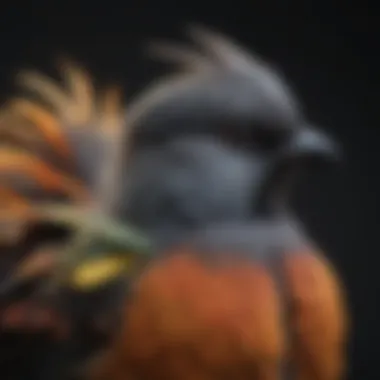
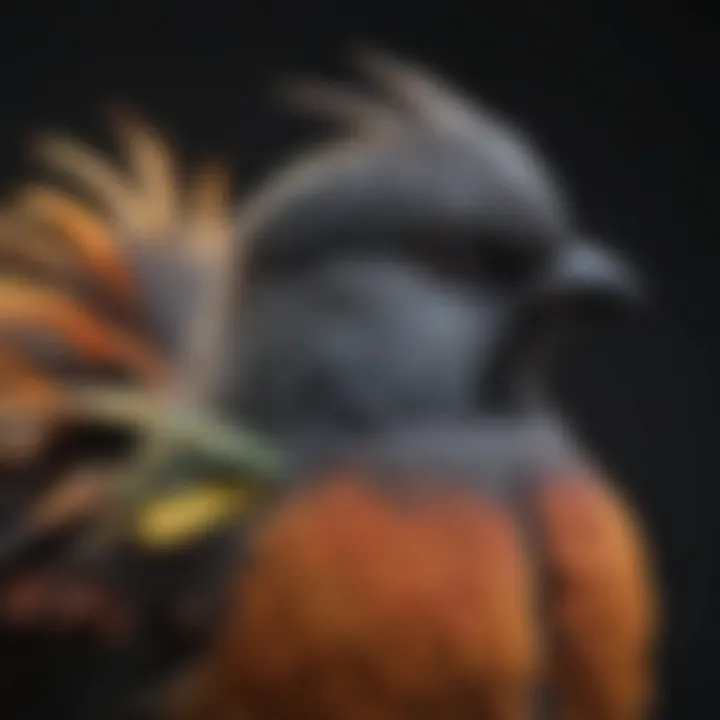
Intro
In the colorful world of pet birds, the guinea bird stands out as a fascinating and rewarding companion. These creatures, often bursting with personality, offer countless joys and challenges for their owners. Many aspiring bird parents may find themselves asking, "What do I need to know to properly care for these enchanting animals?" This article aims to unpack the essentials of keeping guinea birds as pets, addressing not only their dietary and habitat needs but also delving into the emotional connections that can blossom between these avian companions and their humans.
Navigating the responsibilities of pet ownership can seem daunting at first, especially when it comes to understanding the intricacies of guinea bird care. Whether you're a seasoned pet owner or a curious newcomer, the insights provided here will serve as your compass, guiding you through the essential practices to ensure a healthy and fulfilling life for your feathered friends.
Together, we will explore the fundamental aspects of avian care, how to foster a trusting relationship with your bird, and much more. So, roll up your sleeves and let’s dive deeper into the lively realm of pet guinea birds.
Prologue to Pet Guinea Birds
When talking about pet companions, you might not immediately think of guinea birds, but these fascinating creatures have carved out a niche in the hearts of many. Understanding the significance of pet guinea birds is essential for anyone thinking about adding one to their family. They bring joy, laughter, and a unique touch to daily life. with their behavior and voices, they can be utterly delightful.
These birds, while perhaps less common than dogs or cats, embody a special charm and a wealth of personality that can enhance a home. They require care similar to that of other pets; hence, owners should be well informed about their needs. From understanding their social interactions to providing the right dietary provisions, knowledge is power when it comes to ensuring the health and happiness of your feathered friend.
Origin and Domestication
Guinea birds have an interesting history that contributes to their status as beloved pets today. Originating from Africa, these birds were initially wild, living in flocks in the savannas and woodlands. Their domestication began when humans realized their potential for pest control, as they help keep bugs in check.
Over time, they shifted from wild creatures to delightful companions. Unlike more commonly known birds, they have retained some of their wild instincts, which means that potential owners should understand that they might not behave like traditional pet birds. Appreciating their lineage allows for a greater understanding of their needs and quirks. This historical glimpse sheds light on why these birds act the way they do; they are a bridge between the wild and our domestic lives.
Physical Characteristics
When looking at guinea birds, one cannot help but admire their unique appearance. These birds usually weigh between one to four pounds, depending on the breed, and typically stand around 18 to 30 inches tall. Their stunning feathers display a variety of colors from grayish-blue to speckled patterns, with a distinct helmet-like structure on their heads which gives them an air of quirky elegance.
Their eyes are often described as having a captivating intensity, with a visible soft, bright color that can be quite striking in contrast to the paler feathers. Their bodies are compact, and they possess strong, robust legs which allow them to forage energetically around their habitat.
In essence, these characteristics not only add to their visual appeal but also serve functional purposes, like their powerful legs for running and firm grip which aids in climbing and navigating various surfaces. Understanding their physical traits can also help owners create an environment that caters to their natural behaviors, enhancing their overall quality of life.
Understanding Their Behavior
Understanding the behavior of pet guinea birds is crucial for fostering a harmonious relationship between the bird and its owner. Unlike more traditional pet choices, these creatures exhibit unique instincts and characteristics that require keen observation and knowledge. Recognizing the subtleties of their interactions can not only enhance the bird's quality of life but also ensure that owners can address any underlying needs.
When owners understand their birds’ behaviors, they can create an enriched environment, leading to less stress and greater companionship. It’s as if opening a window into their world and gaining insight into what makes them tick – their quirks and preferences become the blueprint for positive experiences and interactions.
Social Interactions
Guinea birds, being social creatures, thrive in environments where they engage with others, both human and avian. When they feel secure and connected, they exhibit behaviors that are rich in emotion. These birds often form strong bonds with their caregivers, displaying affectionate tendencies such as snuggling or preening. Observing the social dynamics of pet guinea birds can be quite enlightening.
Here are some key points regarding their social interactions:
- Group Behavior: In the wild, guinea birds often live in flocks. Therefore, having more than one can prevent loneliness, although it’s important to ensure compatibility.
- Bonding Activities: Engaging in play, like gentle games of hide-and-seek with toys or providing opportunities for exploration, can enhance their social skills.
- Communication: These birds are known to communicate through body language and vocalizations, making it essential for owners to be attentive to both.
Creating a nurturing environment where social interactions can flourish helps in alleviating potential anxiety and ensures that these birds feel valued and cared for.
Common Vocalizations
The vocalizations of guinea birds can be a delightful aspect of their behavior. They are not shy when it comes to expressing their emotions, and their sounds serve as a form of communication. Each squeak, chirp, or whistle carries a meaning that can signal a variety of states - from excitement to distress.
Here are a few common vocalizations and their interpretations:
- Chirping: Often indicates happiness or contentment, especially when they are exercising or playing.
- Repeating Calls: Might suggest they are searching for attention. Responding to these calls can strengthen bonds.
- Creaky Sounds: These can sometimes signal discomfort or concern, warranting further observation of their environment.
Understanding these vocal patterns equips pet owners to respond appropriately, ensuring their birds feel understood and cared for.
Signs of Stress or Boredom
Recognizing signs of stress or boredom in guinea birds is integral to their overall well-being. Like many pets, changes in behavior can be a cry for help. These signs can manifest subtly, making it crucial for owners to be vigilant.
Some common signs include:
- Increased Aggression: Nipping or lunging at hands can indicate agitation or discomfort.
- Excessive Feather-Plucking: A disruptive habit that may arise from coping with stress or lack of stimulation.
- Lethargy: Birds that seem less active or interested in their surroundings may be bored or feeling unwell.

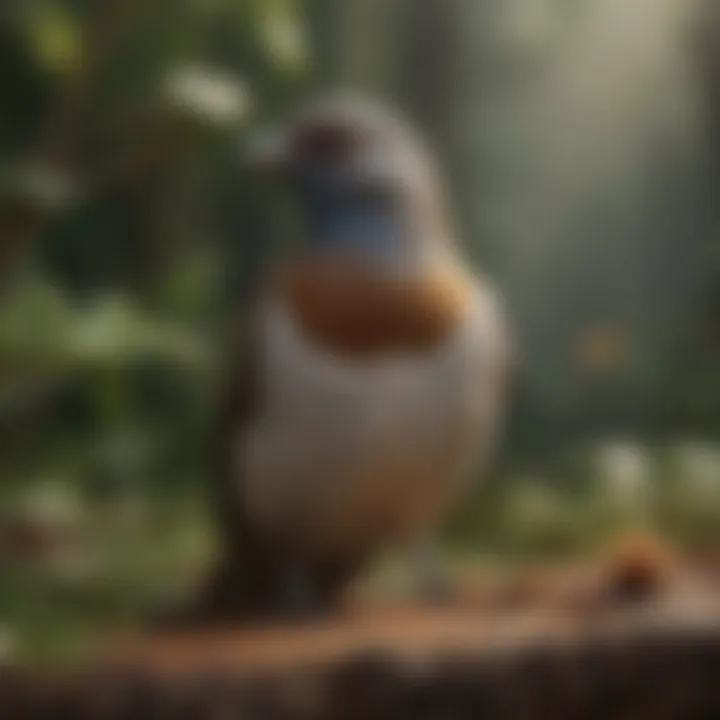
Ensuring these birds have ample environmental enrichment and social interaction is vital. Keeping their space engaging with toys or safe climbing structures can prevent boredom and promote mental stimulation.
"An aware owner can discern their bird's mood through observation, transforming potential distress into enriching playtime and healthier interactions."
In summary, understanding pet guinea birds involves recognizing their behavioral dynamics based on social interaction, vocalizations, and signs of stress or boredom. This insightful comprehension forms the foundation of a strong bond and leads to a happy, thriving pet.
Dietary Needs and Nutrition
Understanding the dietary needs and nutrition of pet guinea birds is crucial for any owner who wants to nurture these affectionate companions in the best possible way. A balanced diet doesn't just promote physical health; it also lays the foundation for your bird's emotional well-being and can significantly enhance their quality of life. Neglecting proper nutrition can lead to various health issues, affecting everything from their feathers to their social behavior. This section delves into essential nutrients, common food types, and what should be strictly avoided in their diet, ensuring that your pet guinea bird stays healthy and happy.
Essential Nutrients
Just as humans require a range of nutrients to thrive, guinea birds also have specific dietary necessities. Proteins, vitamins, minerals, and fats each play unique roles in their growth and overall health.
- Proteins: These are fundamental for growth and tissue repair. Quality protein sources include cooked eggs, legumes, and certain types of seeds.
- Vitamins: Vitamin A, Vitamin D3, and Vitamin E are crucial. Vegetables like carrots and leafy greens can provide these vitamins while adding variety to the diet.
- Minerals: Calcium and phosphorus are particularly important for bone health. Providing a cuttlebone can be an effective way to ensure they get enough calcium.
- Fats: Necessary for energy, fats should come from healthy sources like flaxseeds rather than junk food.
Taking all these into consideration ensures a well-rounded nutrition plan that meets these birds' diverse needs. A diet lacking in essential nutrients often leads to health issues such as feather plucking or weak bones.
Common Food Types
Guinea birds flourish on a diverse diet. Relying solely on seeds is a mistake. Instead, owners should embrace a variety of food types that ensure their feathered friends receive the nutrition they deserve. Here are some common food types:
- Seed Mixes: Look for high-quality blends rich in seeds, grains, and nuts. Be sure to choose those that have lower fat content to avoid obesity.
- Pellets: Specialized pellets designed for pet birds can provide balanced nutrition. Often fortified with vitamins and minerals, they serve as a solid foundation for their diet.
- Fruits and Vegetables: Fresh produce should make up a substantial part of their daily intake. Think leafy greens, bell peppers, and small pieces of fruit such as apples or berries. Always wash produce thoroughly.
- Protein Sources: Cooked eggs or small insects can be excellent protein sources, especially during breeding or molting periods.
It's essential to introduce new foods slowly. Overnight success with a new dish isn't usual; birds might be wary of anything out of the ordinary!
Foods to Avoid
While many foods are beneficial, some can be harmful and even deadly to guinea birds. It's imperative to know which foods to steer clear of:
- Avocado: This fruit contains a toxin called persin that's highly toxic to birds.
- Chocolate: Although it might be a human favorite, chocolate can cause serious heart and nervous system issues in birds.
- Caffeine: Just like chocolate, it is toxic and dangerous.
- Salt: High salt content found in certain human foods can lead to dehydration and kidney problems.
- Onions and Garlic: Both can cause gastrointestinal distress and other health problems.
Make sure to research any new foods thoroughly before introducing them to your pet!
Habitat Setup
Setting up the right habitat for your pet guinea birds is crucial not just for their physical health but also for their mental well-being. A suitable enclosure can significantly influence their mood and overall behavior. Without a comfortable space, your feathered friends may exhibit stress, leading to undesirable behaviors down the line. Hence, creating an optimal habitat involves various factors, including cage dimensions, necessary accessories, and environmental enrichment—all vital components that ensure your bird thrives and flourishes in its new home.
Ideal Cage Dimensions
When it comes to choosing the right cage for your guinea birds, size matters more than you might think. A bigger cage offers them the chance to spread their wings, quite literally. As a general rule, aim for a cage that’s at least 24 inches wide, 24 inches deep, and 36 inches tall for a pair of birds. An adequately sized cage will prevent stress and give your birds the opportunity to move around freely, interact, and play.
Moreover, the height of the cage also plays a role. Birds are natural climbers and often enjoy perching at various heights. Tall, sturdy structures allow them to engage in their instinctual acts, keeping them happy and content.
It's worth noting that while larger cages are always preferable, the cage design itself should support safe and easy movement. Horizontal bars aid in climbing and encourage exercise, further contributing to your birds’ physical health.
Necessary Accessories
Filling the cage with essential accessories is just as important as the cage itself. Here are some must-haves to consider:
- Perches: Use multiple perches made from different materials to offer variety and stimulate your birds' feet.
- Food and Water Dishes: Ensure these are easily accessible but not placed under perches to prevent contamination.
- Bird Toys: Provide a selection of toys to promote mental stimulation. Rotate them regularly to keep your birds engaged.
- Caves and Hiding Spots: Birds also need spaces to retreat when feeling overwhelmed, so including soft materials or small huts can help.
In essence, the objective is to create an inviting and versatile living environment that allows the birds to explore, hide, and play, crucial for their mental well-being.
Environmental Enrichment
Beyond essential accessories, environmental enrichment refers to the additional features that can keep your guinea birds active and engaged. Here’s how to enhance their environment:
- Rotate Toys: Regularly changing out toys can keep things fresh and exciting. You can include a mix of chew toys and foraging toys that challenge their skills.
- Natural Elements: Adding branches, leaves, or even safe grasses not only mimics their natural habitat but also provides opportunities to engage in natural behaviors.
- Interactive Setup: Consider creating different sections within the cage with varying types of perches and toys that encourage movement and exploration.
"A diverse environment is not just a luxury for guinea birds; it's a necessity for their mental health."
Incorporating all these elements helps in making the cage a lively space that promotes wellbeing. A well-thought-out habitat setup does much more than house your birds; it offers them an enriched life that they can thrive in, enhancing your experience as a bird owner as well.
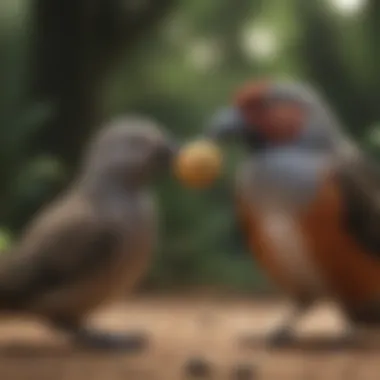
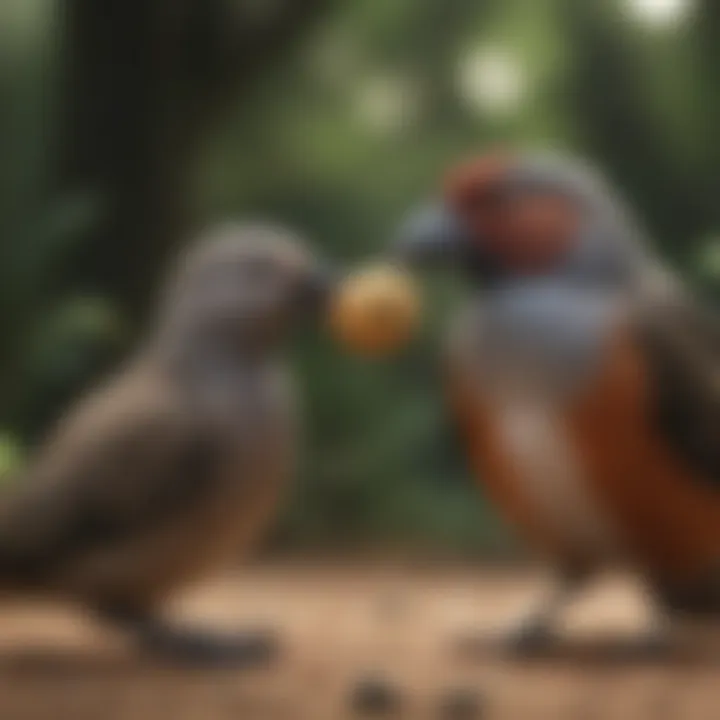
Healthcare and Maintenance
When it comes to being a responsible pet guinea bird owner, healthcare and maintenance should be at the top of your priority list. Just like any other companion animal, these feathery friends require regular attention to stay healthy and thrive. Establishing a routine that includes veterinary visits, monitoring their behavior, and understanding their health needs can make a world of difference in their well-being.
Keeping a close eye on your bird not only ensures they live a longer life but also enriches your relationship with them. After all, a healthy bird is a happy bird, and fostering that happiness requires a commitment to care and maintenance.
Regular Check-ups
One of the cornerstones of healthcare for guinea birds is scheduling regular veterinary check-ups. Ideally, these should happen at least once a year, though some birds may need more frequent visits if they have underlying health issues or if they’re older. During these visits, the vet will usually check:
- Weight: Dramatic weight changes can indicate health issues.
- Feather Condition: Healthy feathers are a sign of a thriving bird.
- Nail and Beak Health: Overgrown nails or beaks can be uncomfortable.
It’s also during these check-ups that you can ask questions about diet, behavioral changes, and any peculiarities in your bird’s behavior. By building a rapport with a vet who specializes in avian care, you are setting the stage for proactive health management.
Common Health Issues
Guinea birds, like any other pets, are also susceptible to certain health issues. Here are some common ones to be aware of:
- Respiratory Infections: Symptoms can include sneezing or labored breathing, often caused by poor air quality.
- Obesity: A diet too rich in calories can lead to weight problems, increasing the risk of other health issues.
- Parasites: Both internal and external parasites can affect birds.
Understanding these issues allows bird owners to stay vigilant. If you notice any strange behaviors or symptoms, it's crucial to address them right away.
Signs of Illness to Watch For
Being alert to signs of illness will help you catch problems before they escalate. Here are some warning signs:
- Changes in Appetite: Eating less or not eating at all can suggest underlying health concerns.
- Lethargy: If your bird is quieter than normal or sleeping excessively, something might be amiss.
- Feather Plucking: This can be a physical or psychological issue.
- Changes in Droppings: Diarrhea or excessively watery droppings can indicate digestive problems.
Taking action immediately when you notice these signs can prevent a small issue from transforming into a serious health crisis.
"An ounce of prevention is worth a pound of cure." Keeping your guinea bird healthy requires patience, attention, and consistent care. By investing time in healthcare and maintenance, you assure not just their health but also build a strong bond of trust and companionship.
Training and Socialization
Training and socialization come with a wealth of benefits for both pet guinea birds and their owners. Understanding these aspects is fundamental to creating a harmonious living environment. Proper training not only helps in molding good behaviors but also enhances the bond between the bird and its owner. Moreover, well-socialized guinea birds tend to be less stressed and more adaptable, providing them with a greater sense of security and comfort in their surroundings.
Basic Commands
Teaching basic commands is akin to laying down the groundwork of communication between you and your guinea bird. Start with simple commands like "step up" and "come here." Use a gentle tone, consistent repetitions, and positive reinforcement to make these lessons effective. You can utilize seeds or small treats as rewards, motivating your bird to respond positively.
- Step Up: Place your finger in front of the bird’s feet. When they step onto your finger, offer a treat. This establishes trust and promotes bonding.
- Come Here: Gradually move away, calling your bird's name. When they follow, reward them generously.
Keeping training sessions short and engaging is crucial. Aiming for just a few minutes at a time prevents your feathered friend from losing interest or feeling overwhelmed.
Promoting Positive Habits
Promoting positive habits is vital for a guinea bird's well-being. Start by creating a structured routine. Birds benefit from consistency, so offering meals, social time, and playtime at the same times each day can ease anxiety.
Incorporating toys into the bird’s environment is another powerful way to foster positive behaviors. For example:
- Chew Toys: Encourage natural behaviors, preventing boredom and destructive tendencies.
- Foraging Toys: Stimulate mental engagement and mimic natural foraging behaviors.
Providing a mix of social interactions and solitary playtime helps develop confidence. It's important to be observant. If you notice signs of stress, like excessive vocalization or biting, reevaluate the environment or routine. Adjusting factors—like noise levels or removing a particular toy—can significantly improve your pet's mood.
Interacting with Other Pets
When it comes to introducing guinea birds to other pets, cautious and gradual interactions are key. Some birds, depending on their personality, are more open to companionship than others. Start by allowing your guinea bird to observe other pets at a safe distance, ensuring that it feels secure before further interactions take place.
To facilitate positive experiences, consider these points:
- Supervised Visits: Always supervise any interaction to monitor behavior closely.
- Creating Boundaries: Use playpens or cages during initial introductions to prevent any injuries or undue stress. This creates a controlled environment where both pets can get accustomed to each other without feeling threatened.
- Positive Reinforcement: Reward calm behavior from both your bird and other pets. Treats can go a long way in forming positive associations during these interactions.
Remember that some birds might never feel completely comfortable around other pets, which is perfectly fine. The ultimate goal is to ensure that every animal feels safe and happy in their shared home.
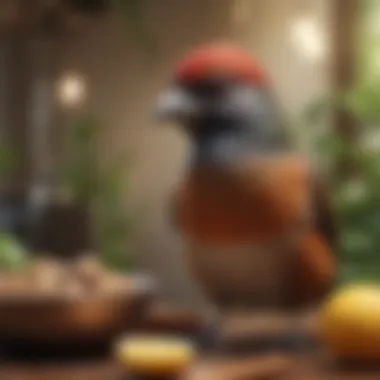
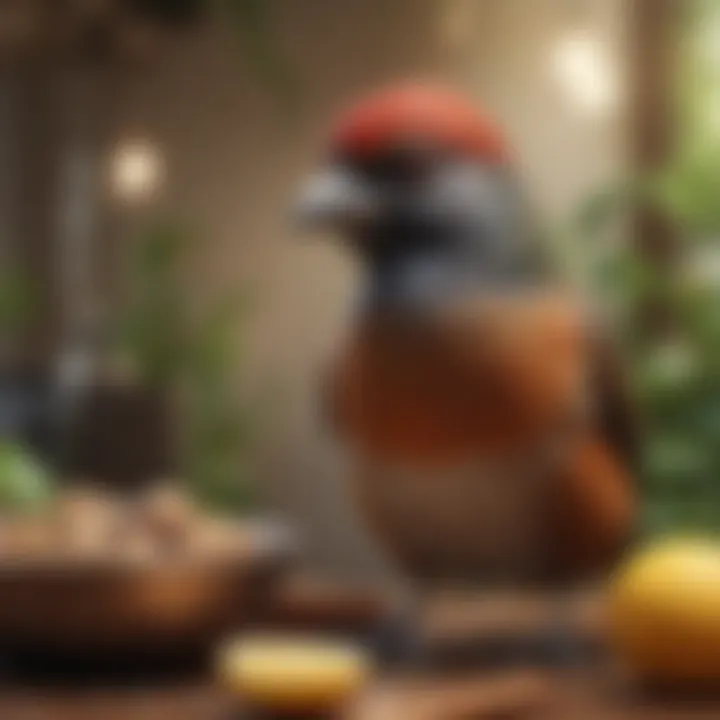
Understanding Emotional Bonds
Developing emotional bonds with pet guinea birds is an integral aspect of enriching their lives and enhancing the relationship between the bird and its owner. These bonds can significantly contribute to the well-being of the birds and the satisfaction of the owner, as they cultivate a deeper understanding of each other's needs and behaviors. Understanding the emotional connection with these birds is essential for providing them with a fulfilling life, and it allows owners to become better caregivers.
The importance of emotional bonds in the context of pet ownership cannot be overstated. A guinea bird that feels secure and loved is more likely to exhibit healthy behaviors and less likely to show signs of stress. Over time, owners may notice their birds responding in positive ways, such as seeking their company and displaying more relaxed postures. Recognition of affection and emotional needs contributes to a harmonious household where both pet and owner thrive.
Recognizing Affection
Recognizing affection in guinea birds can sometimes be a gentle dance of cues and signals. These creatures may not express their emotions like a dog or cat, but they have their own ways of showing they care. For instance, when a guinea bird nuzzles against its owner’s hand or preens their feathers, it's a clear sign of trust and affection. The little chirps and soft whistles can also indicate contentment. Their body language, such as feather fluffing or a relaxed stance, can hint at their emotional state.
To deepen this bond, spending time to observe the behavior of your guinea bird is crucial. Engaging in activities such as gentle handling, talking softly, or letting them explore can revitalize these emotional ties. Here are a few ways to recognize affection:
- Soft vocalizations: When your bird chirps lightly while around you, it shows they enjoy your presence.
- Increased interactions: If they actively seek your attention by hopping towards you, it means they feel comfortable.
- Mimicry: Birds that mimic their owners can be showing affection, as they wish to connect on a communicative level.
Conversely, if a bird begins to avoid interaction or shows signs of distress, it may suggest that they do not feel that emotional security. Hence, paying attention to these signals can bolster the bond you share.
Emotional Needs of Guinea Birds
The emotional needs of guinea birds revolve around social interaction, mental stimulation, and a stable environment. These birds are social creatures at heart and thrive when they have adequate companionship—either from their owners or fellow birds. If you find that your bird seems lonely or disinterested, consider arranging playtime or even introducing another companion.
A key component to meeting their emotional needs is to provide stimulating environments. Here are some effective strategies for ensuring emotional health:
- Variety in Toys: Rotate toys frequently to maintain their interest.
- Social Interaction: Spend time talking or playing with them on a daily basis.
- Safe Spaces: Create areas where they can explore and feel safe to retreat when feeling overwhelmed.
Guinea birds also require mental exercise to keep boredom at bay. Enrichment activities encourage good mental health; they might include foraging opportunities or puzzles that require problem-solving.
"Ensuring a guinea bird’s emotional health is pivotal for its happiness and longevity, just as it is for any beloved pet."
Ultimately, fostering emotional bonds with guinea birds can lead to a deeply fulfilling relationship. When their emotional needs are met, not only do owners find joy in their companionship, but the birds also live healthier, more vibrant lives. This nurturing atmosphere benefits everyone involved, offering lasting rewards and a connection that can transform both the bird and owner experience.
Challenges of Ownership
Owning a pet guinea bird can be one of life's true joys, but it comes with its unique set of challenges. This section will explore the importance of understanding these challenges before bringing a guinea bird into your home. Addressing elements like time commitment and financial considerations not only prepares prospective owners for the reality of caring for these creatures but also enhances the relationship between the bird and its human companion. Making informed decisions can ensure that you provide the best possible environment for your feathered friend.
Time Commitment
Taking on the responsibility of a pet guinea bird requires a significant investment of time. Unlike some pets that can be left alone for extended periods, guinea birds thrive on social interaction. They are social creatures, needing daily engagement and stimulation. Providing adequate time for play, training, and care is crucial. Many owners might underestimate the amount of attention these birds require.
- Daily Interaction: Each bird needs at least a couple of hours of focused interaction daily. This interaction can come from playtime outside the cage or simply sitting nearby to talk or observe.
- Feeding and Maintenance: Routine feeding is another daily task. Fresh food and water must be provided right on schedule. Guineas also require regular cage cleaning to prevent illness and to promote a healthy living environment.
- Training Time: If you plan on training your guinea bird to recognize commands or engage in tricks, patience is key. Short, effective training sessions will promote an environment for learning. One must allocate time specifically for this purpose.
In summary, it’s important to recognize that a guinea bird is not just a passive pet but rather an engaging companion that thrives when included in everyday activities.
Financial Considerations
The financial aspects of owning a guinea bird can be as challenging as the time commitment. While initial costs may seem manageable, ongoing expenses can quickly add up, necessitating careful planning and budgeting.
- Initial Expenses: When starting out, be prepared to invest in a high-quality cage, toys, and other accessories. This initial outlay can range from modest to substantial, depending on preferences.
- Regular Supplies: Monthly purchases such as food, bedding, and cleaning supplies can continuously strain your budget. Remember, quality feeds and toys are essential for health and enrichment of your bird.
- Healthcare Costs: Routine veterinary care is another consideration. Regular check-ups and emergency visits can become costly, especially if your bird requires specialized care.
"Owning a pet is not just about the joy they bring, but also the responsibilities and costs that come along with that companionship."
By being aware of the financial aspects and making a budget that includes not just the basics but also savings for unforeseen challenges, you can ensure that your guinea bird leads a fulfilling life without putting undue stress on your finances.
End: The Value of Companionship
In winding down our exploration of pet guinea birds, it becomes evident that the companionship these creatures grant extends far beyond fun and games. For many, the bond formed with their feathered friends creates a sense of purpose and fulfillment, enriching both lives in ways that are often unmeasured. The emotional intelligence that guinea birds possess is nothing short of remarkable; their capacity for attachment and interaction speaks to the deeper connection that pet owners can nurture.
Long-term Commitment
Owning a guinea bird is not just a passing fancy; it is a journey that requires dedication. These birds often have a lifespan averaging between 5 to 15 years, depending on their species and care. This longevity necessitates a commitment not only in time but also in understanding their evolving needs. It involves routinely assessing their health, providing an enriching environment, and fostering a strong social connection.
"A pet is not just an animal; it’s a part of your life. The bond you create with a guinea bird can transform your everyday routine into something beautiful and fulfilling."
An owner must also prepare for scattered feathers and the occasional noise. Regular interaction is vital, as loneliness can lead to behavioral issues. If you’re considering this companionship, ask yourself: Are you ready for a long-term relationship? This question can guide you in making a thoughtful choice.
Reflections on Ownership Experience
Reflecting on the journey of owning a guinea bird reveals layers of joy and challenges. Many owners discover that their pets have unique personalities—ones that may surprise and delight them. These birds can express joy with cheerful chirps or show displeasure with ruffled feathers. Such interactions often lead to countless laughs and stories to share.
Moreover, the responsibility of caring for another living being creates an environment of growth. Owners often find themselves learning about avian health, nutrition, and behavioral quirks, which can turn into educational pursuits that enrich their lives and broaden their horizons.















